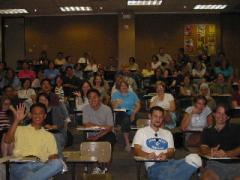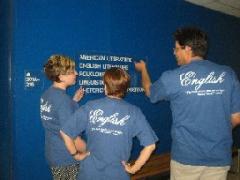|

Graduate students at the fall meeting
|
As the leading humanities program within a large public university serving a diverse population, The Department of English at Texas A&M University
takes seriously its ethical obligation to provide high quality doctoral
training for its students. With the new ideas and new strategies that
will emerge through our participation in the CID, our Ph.D. graduates
will be increasingly well-situated to provide intellectual leadership
within the discipline. For more information, please visit our Graduate
English Program webpage here.
|
|
|
Contact Information The
CID leadership team is: Dr. Valerie Balester, Abby Bowers, Dr. Douglas
Brooks, Dr. Kimberly Brown, Jaemin Choi, David Cockley, Dragana
Djordjevic, Chris Garrett, Meghan Gilbert, Julie Groesch, Dr. Jim
Harner, Ki Yoon Jang, Dr. Katherine Kelly, Dr. Shari Kendall, Dr.
Jimmie Killingsworth, Dr. J. Lawrence Mitchell, Amy Montz, Gina
Opdycke, Dr. Victoria Rosner, Asmahan Sallah, Sarah Spring, Dr. Susan
Stabile, Dr. Jan Swearingen, Mick White, Anne Marie Womack For
information about our role in the CID, please contact: Dr. Victoria
Rosner, Associate Director of Graduate Studies; Department of English,
Texas A&M University, College Station, TX 77843; vpr@tamu.edu
|
|
|
|
Our Goals for the CID We
consider this initiative vital to our mission of providing access and
support in the spirit of a more thoroughly democratized educational
environment. Our theme for this year's involvement in the CID,
"Building Inclusive Intellectual Communities," responds to our
department's beliefs in empowering our graduate students and engaging
faculty and graduate students in intellectual and professional
discussions, both in and out of the classroom.
|
|

the English Department t-shirt
|
|
|
|
Initiatives Under the CID Writing for Publication Seminar:
This seminar is inspired by two goals of the CID: professional training
and the pedagogy of research. Over a semester, ABD students enrolled in
the seminar will learn what a publishable article is and explore the
professional standards that guide scholarly research and writing. Curriculum Revision:
Over the past year, we have reoriented our curriculum around our
faculty interest groups. The interest groups (or concentrations) help
promote academic communities between faculty and graduate students
based on similar scholarly interests and concerns.
Review of Departmental Work, 2003-2004
|
|
|
|
Timeline Academic Year 2004-2005: Over
the course of the next year, we will design experiments to help us
deepen, enrich, and extend the intellectual community with the
department for graduate students and faculty alike. Our challenges this
year include reconceiving the core courses for Ph.D. students,
redesigning the preliminary exam structure, expanding faculty working
groups to include more graduate student participation, and more. We
also plan to develop colloquia on teaching literature for graduate
students. These roundtable discussions will encourage dialogue among
faculty members and graduate students on the teaching of literature
within different fields.
|
|
|
Fall 2005: Our
English and History departments are sponsoring a conference inspired by
the CID's call for interdisciplinary work. This conference, "Shifting
Boundaries: The Humanities Doctorate in the 21st Century," will focus
on three main points: information technology and its role in reshaping
the doctorate and disciplines, interdisciplinarity, and
internationalization, both in terms of topic ("world English," "world
history") and in terms of students and scholars.
|
|
|